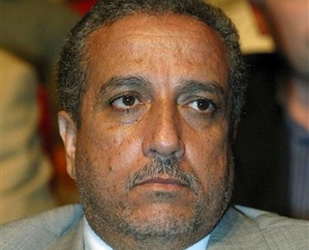Dozens held over Morocco plot
Police arrest 32 people for planning to kill army officers, ministers and Moroccan Jews.

Mohamed Ayyadi, spokesperson of al-Badil al-Hadari, said:“For us, it is astonishing news because since we founded our party we have made it clear that democracy is our goal and we’ve proved that when we were among the first parties to condemn al-Qaeda and the use of violence in politics.”
The detainees are accused of planning to kill senior army officers, government ministers and some Moroccan Jews, Chakib Benmoussa, the interior minister, announced on Wednesday.
He told a news conference: “The network has a two-pronged strategy: one for political activity, with al-Badil al-Hadari as its public face, and another clandestine focusing on military action.
“The network set up a military wing named Special Action Group.”
He said the party, whose name translates as Civilised Alternative, had links with an organisation called the Moroccan Islamic Combatant Group (GICM) and Algeria’s Salafist Group for Preaching and Combat (GSPC), which last year changed its name to Al-Qaeda Organisation in the Islamic Maghreb.
According to Benmoussa, the network had contacts with al-Qaeda in Afghanistan in 2001.
He said it sought to organise training with Hezbollah in Lebanon in 2005, and that some members had access to training in making explosives.
Benmoussa said members of the network, launched in 1992, had carried out murders in Belgium, where its Moroccan leader, Abdelkader Belliraj, lived.
He added that Belliraj had allegedly killed six people in Belgium between 1986 and 1989.
Cash and weapons
According to Benmoussa, a large consignment of weapons found by police had been financed by hold-ups abroad, notably one on a security firm in Luxembourg in 2000.
 |
| Benmoussa said the group had carried out crimes internationally [AFP] |
Police found at least 34 weapons, including Israeli-made Uzi and Kalashnikov assault rifles and machine guns, in raids on homes and offices of the suspects.
The minister said a member of the network working with European criminals had held-up a Brussels subsidiary of security firm Brink’s CO in 2000 to steal 17.5 million euros.
“The heist from this hold-up enabled the network to introduce the equivalent of 30 million dirhams [$3.89 million] in 2001 to Morocco to fund its activities,” he said.
The money was laundered through investments in tourism, real estate and businesses across Morocco.
Jewellery stolen in Belgium was also smuggled into Morocco and turned into ingots by a goldsmith, who had also been arrested.
Arrests
The 32 suspects also include a police officer and a journalist.
Abdelhafid Sriti is the Rabat correspondent of the Lebanese television station Al-Manar, which belongs to the Shia Hezbollah organisation.
Three Moroccans resident in Belgium, including suspected leader Belliraj, are among those indicted.
The allegations against Moatassim were the first levelled at a leader of a legal Islamist party.
Abbas El Fassi, the Moroccan prime minister, said in a statement that the decision to ban the party, was taken “on account of the proven links between the (dismantled) network and the creation of this party”.
Attacks
Following a suicide attack in Casablanca in May 2003 that left 45 dead, Morocco adopted a law aimed at tackling extremist movements.
But the independent Le Soir paper noted it was the first time since then that leaders of Islamist parties had been arrested for suspected terrorist links in Morocco.
Two further bomb attacks in Casablanca followed in 2007, while there was an attempted suicide attack against foreign tourists in Meknes, east of Rabat, in August last year.
Morocco‘s government says it has broken up more than 60 cells of terror suspects since 2003. It has arrested more than 3,000 people in the process.